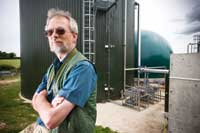2010 FW Awards: Green Energy Farmer of the Year Finalist – Stephen Temple

Plenty of farmers have found themselves unexpectedly bitten by the green energy bug over the past few years. But few could rival Norfolk farmer Stephen Temple for the sheer length of time he has been involved with producing renewable power.
In fact, you have to go back to 1970s Africa to pinpoint Stephen’s first encounter with both making and saving fuel. “I was working on projects to reduce the vast energy required for tobacco curing,” he says. “42cu m of wood was being used to dry a single tonne of the crop, but we cut that sharply.” He also helped build simple anaerobic digestion plants for local usage.
In 1998, he and his wife Catherine returned from Africa to the family farm near Wells-next-the-Sea in north Norfolk. The 230ha mixed arable and dairy business includes a thriving cheese-making enterprise that saw 27t of cheese made last year.
Though very busy with the day-to-day running of the farm, they were always on the lookout for ways to cut their energy bills too. “I suppose you could say we were committed greenies from the start,” they point out.
Their first chance came in 1999 when Stephen designed the Barn Owl grainstore monitoring and control system. This cuts electricity use by allowing the fans to run only when they give maximum benefit and has gone on to become a considerable commercial success too.
In 2003, when the boiler that heated the large and draughty farmhouse spluttered to the end of its life, they installed a biomass boiler that ran on woodchip and spoiled grain.
But though the new boiler only used £800-worth of woodchip a year, it wasn’t happy with the low summer loading. So the Temples hooked it up to provide hot water for the milking parlour, thereby saving £750 of electricity in one fell swoop.
That same year Stephen also turned his attention to that great devourer of energy, the grainstore. Here, the annual £5000 bill for LPG was slashed by installing a round bale-fired boiler and giant radiator to provide copious hot air, for which he designed a control system now available commercially. Annual fuel use dropped to just £400.
Three years later they installed a second, smaller boiler to give all-year-round hot water for the cheese-making enterprise.
But the biggest project to date is the farm’s anaerobic digester. Work began in 2008 and finished in early 2009 at a total cost of some £750,000 – sadly a £100,000 bioenergy capital grant had to be turned down.
The plant uses slurry from the farm’s cows, maize silage, fodder beet and whey from the cheese making to produce methane. This in turn powers a beefy 140kW combined heat and power (CHP) unit, which sends electricity to the grid and hot water and heat to the dairy, cheese-making business and farmhouse.
It also warms the cows’ drinking water, powers the grain drier and will soon supply nearby houses too.
The immense effort, enthusiasm and planning required to set all this up has made the Temples’ lives even busier than usual. And there’s been a lot of extra form-filling to do.
“It’s been a paperwork nightmare with endless, endless phone calls,” admits Stephen. “But we feel we’re easing the way for other farmers wanting to do this.”
They keep their own personal energy consumption down too, for example by running two small diesel cars with 60mpg+ thirst. Low-energy bulbs have been fitted throughout, a variable-speed vacuum pump cuts milking costs and tractor fuel consumption is carefully monitored.
The Temples are great ambassadors for the green energy movement too, spreading the message to visitors on Open Farm Sunday and Farmhouse Breakfast Week, as well as welcoming an almost endless queue of curious visitors fascinated by the achievements of this tireless Norfolk couple.
FARM FACTS
Farming enterprises
• 230ha arable and dairy farm
• 100 cows
• Cheese-making enterprise (25t a year)
Energy enterprises
• Anaerobic digester and combined heat and power unit
• Biomass boilers
• Many heat and power saving measures
• Tractor fuel use carefully monitored
THE JUDGES LIKED
• Tremendous enthusiasm
• Mix of small and big enterprises
• High level of community engagement

